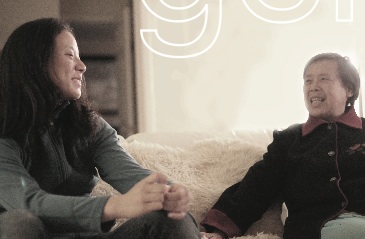 Despite generation gaps, the Feng family finds common ground through understanding, love
Despite generation gaps, the Feng family finds common ground through understanding, love
“Mom, we can’t be here all night,” says freshman Karen Feng in response to her mother’s suggestion that she speak in chinese tonight. Despite her mother Camille Chen offering to help translate, Feng remains reluctant.
“Here, there is an obvious generation gap between us,” Chen says, speaking in a blend of Chinese and English. “I want her to use Chinese so her grandma can understand.”
This is the sixth year that Feng, her parents, and her maternal grandmother Mei Hua Yang and grandfather Yae Quan Chen—three generations—have been living together. A 2010 report based on U.S. Census Bureau data by the Pew Research Center found that 16 percent of the U.S. population currently lives in a multi-generational household. Although three generations living under one roof comes with its problems, there seems to be a general consensus in Feng’s family that overcoming the conflicts that arise from opposing viewpoints has helped build a stronger bond within the family.
 Through her personal experiences with raising children and then grandchildren, Yang, a fairly liberal Buddhist and Democrat, believes that generation gaps increase with age.
Through her personal experiences with raising children and then grandchildren, Yang, a fairly liberal Buddhist and Democrat, believes that generation gaps increase with age.
According to her, children are born dependent on their elders. But the inevitable happens: Children become teenagers who then become adults, and along the way, they develop ideas of their own. That’s when division between the generations begins to form.
According to another report by the Pew Research Center, only 26 percent of the public believes there are strong conflicts between younger and older generations. Religion is one area of contention with 41 percent of people considering it an issue between the generations. Yang’s Buddhist beliefs lead to some discrepancy between her and her daughter, who prefers to look at things from a scientific perspective. Even so, they’ve found some mutual understanding, letting religion dictate one aspect of their lives while allowing science to govern another.
“We have to find common ground,” Chen said, “because sometimes things can’t be explained by science. Why [did the] earthquake happen in Japan? Why do some families have no problems while other families have many?”
Yang considers herself to be fairly liberal on the topic of raising children. She goes by a Chinese belief based on the idea of tolerance, ren.
“When Chinese people educate their children,” Yang said, “they teach them to endure hardship rather than fight back.”
Between Feng and her grandmother there are areas the two don’t see eye-to-eye on as well.
“Even though they say they’re more liberal, more Americanized, [the older generation is] still more conservative than us,” Feng said. “If I don’t blow-dry my hair, [my grandmother] will yell at me [and say] I’ll get a cold… I know it’s not true, [but] I still have to listen to [my grandparents] because they are older [and so they have] authority.”
Despite differences in their beliefs, the Feng family solves their issues in a way that ends up building a solid foundation for the family. According to Chen, conflict allows family members to look at problems from a different perspective, which invariably leads to a better sense of understanding and empathy.
Feng says living with her grandparents has taught her the morals of a different generation set, like respect. Perhaps the fact that they are family is rapport enough.
“It’s not so much our views on religion or stuff we usually discuss [that’s common ground],” Feng said. “It’s just as a family, we respect each other.”
Chen thinks the similarities between them are simply a part of human nature: the golden rule, which is “regardless of race, gender, age.”
Feng’s grandfather clears his throat and struggles in his heavily-accented English, but he manages to get the words out.
“Love,” he says. “Love.”





